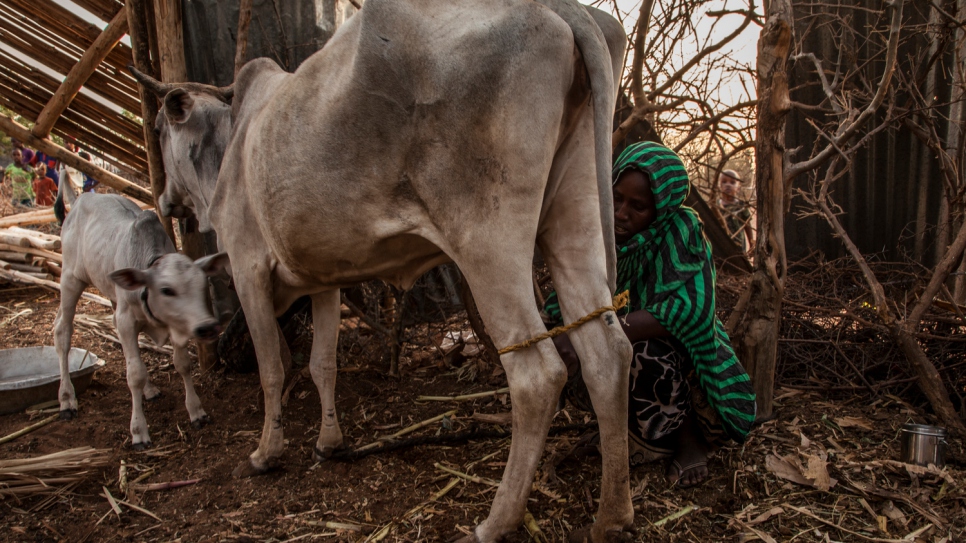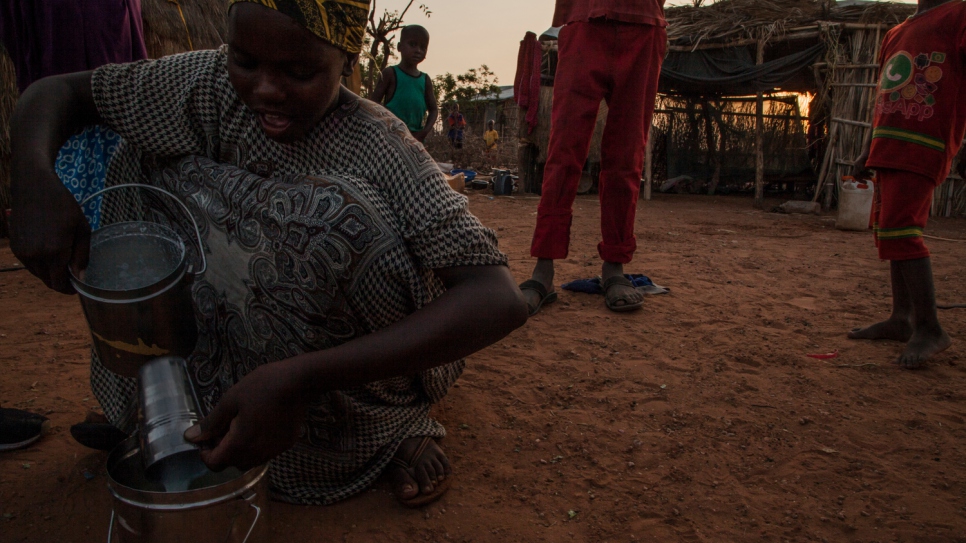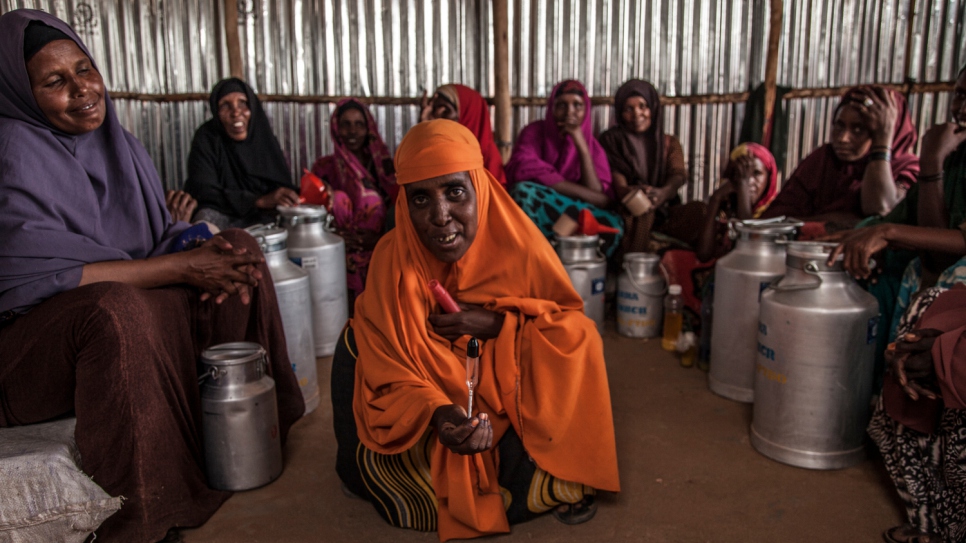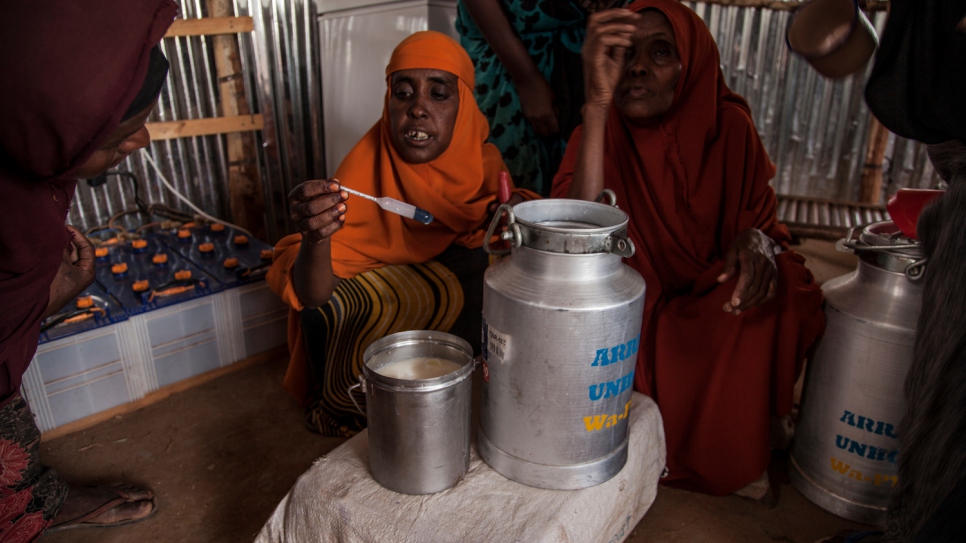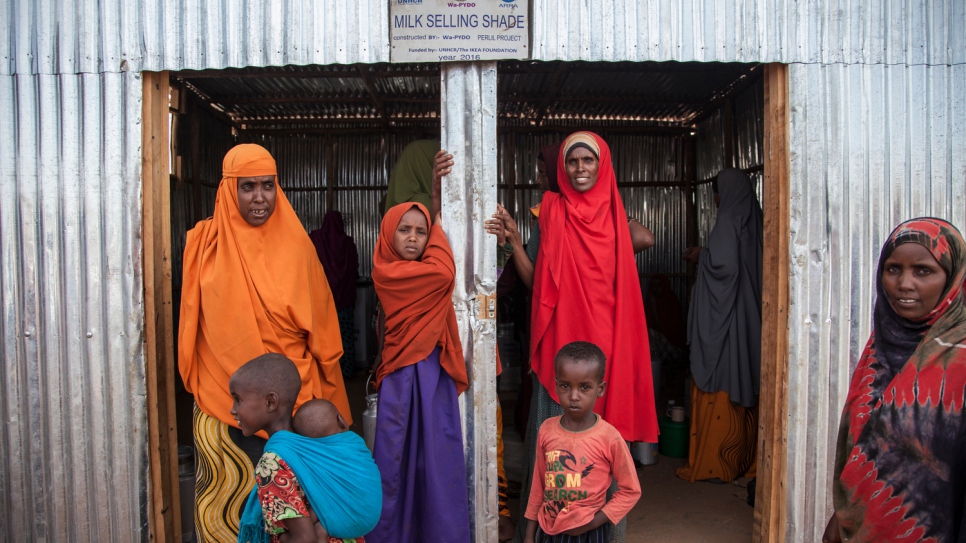Dairy start-up empowers Somali women refugees
Uprooted from their homes, 20 refugee women find new independence by opening a dairy cooperative in Ethiopia.
Somali women measure out milk to sell at the Milk Retailer Cooperative at Melkadida refugee camp in Ethiopia.
© UNHCR/Diana Diaz
It is eight o’clock in the morning. As punctual as ever, Jamila Ali Hassan, 30, opens the creaking door of the Dairy Retail Cooperative in the Melkadida refugee camp, ready to receive the farmers who beat a path to the door.
“We want self-reliance for ourselves and we want to be able to support our children,” says Jamila, proudly. “Now we have a proper business where we sell high quality milk.”
The tin-roofed start-up at the camp, 70 kilometres from the border with Somalia in southern Ethiopia, buys up goat, cow and camel milk from local herders.
Supported by UNHCR, the UN Refugee Agency, and its partners, the project provides both a service to the camp and local community and a living for the 20 Somali women who work there, testing, pasteurizing and storing the milk in solar-powered refrigerators for resale.
“We want self-reliance for ourselves and we want to be able to support our children.”
“Now we have the cooperative and the partners on our side, we have a proper business,” Jamila says.
It is not the first time Jamila has sold milk. Back in Somalia, before conflict forced the couple and their eight children to flee for Ethiopia in 2010, she and her husband had worked as farmers and pastoralists.
“In Somalia, women are the ones who care for the cattle. All my life I have been selling milk, transporting it from our farm all the way to the border. I am happy I found a livelihood here that I am used to,” she says.
After just a few visits from farmers, Jamila and the other 19 women have enough milk to sell. In a good day, they can earn up to 540 Ethiopian Birr – equivalent to US$26 – part of which they plough back into the business.
“We save some of the money, use some of it to buy goods, and then collect the rest in a pot, as part of our tradition, which is then assigned to each one of us by turns,” says Nuria Hassen, another member of the cooperative. “This is our way of supporting each other,” she adds.
The group pasteurizes the milk by slowly heating it – a process which kills potentially harmful microbes, while conserving its nutritional qualities. “We are known for our quality milk and we would like to keep it that way for our business to prosper,” says Nuria, holding up a thermometer that is part of the dairy’s milk processing kit.
The women have quickly taken ownership of the initiative and, together, they form a powerful unit. “It is in our culture that the women stick together,” says Jamila. “All women in the world should come together so they can thrive as one. A woman who does not work cannot even have a cup of tea.”
Ethiopia has been a generous host to Somali refugees since they began arriving in the early 1990s, following the fall of Siad Barre's regime in Somalia. UNHCR and partners including the IKEA Foundation have supported the enterprise since 2015, providing training and equipment for the dairy, which is seen as a benefit to the whole local community.
“The refugee women do not only become empowered and earn income, they also contribute to the refugee and Ethiopian community.”
“Through this business, the refugee women do not only become empowered and earn income, they also contribute to the refugee and Ethiopian community by introducing a quality and safe product into the market,” explains Aurthur Mutambikwa, a UNHCR livelihoods officer in Melkadida.
As five o’clock comes around, the women have sold their stock and they head home to their families. Any leftover milk is stored in the solar-powered refrigerator to sell the next day.
The theme of International Women’s Day – which is today – is forging a better, more equitable working world, in which women's right to decent work becomes a reality. For these Somali women, the cooperative has brought some cherished dreams within reach.
“I want all of us to be self-reliant and our business to expand so we can support our children,” says Jamila. “I was forced to leave everything behind when the conflict reached my home town back in 2010 in Somalia. Here, I have found peace and a new beginning – here is where I want to stay. With all these opportunities, we are on the right path.”
You can read more about how UNHCR works to support women here.

